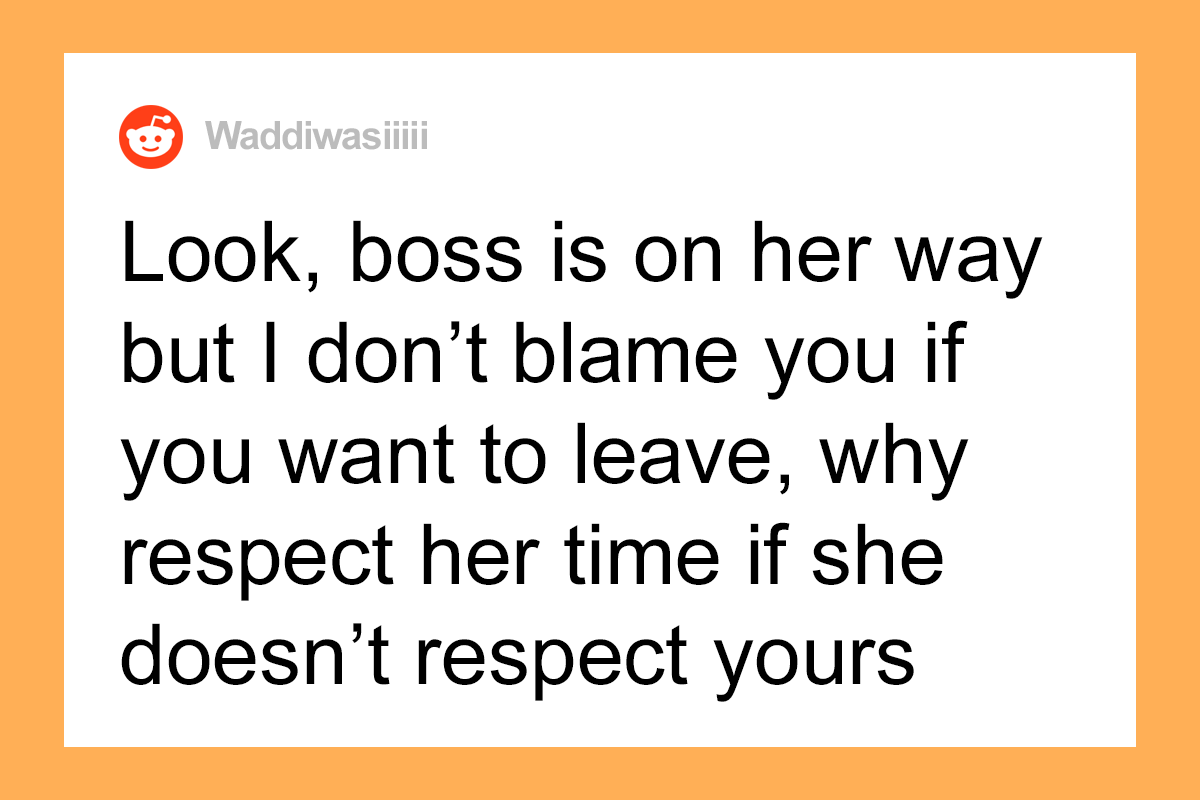
“How To Train Your Boss”: Bartender Manages To Secretly Train Her Boss To Come On Time And Her Story Goes Viral
Those of us who know what it’s like to do shift work understand the importance of punctuality. By showing up on time, not only can we better prepare ourselves for what lies ahead, but we also avoid managers breathing down our neck—which they will if they notice us “slacking”, no matter what has caused it.
However, when they’re late themselves, suddenly all excuses become valid.
A few days ago, Reddit user Waddiwasiiiii submitted a story to the popular r/AntiWork community. In it, the bartender describes a period when their restaurant became short-staffed and their boss couldn’t get anyone to join the team. A big part of the problem was that the lady constantly made her interviewees wait for up to an hour without giving much of a reason why.
Since she was too self-absorbed to figure out why she can’t fill the vacant positions, Waddiwasiiiii came up with a plan on how to secretly teach her proper etiquette.
Image credits: MART PRODUCTION (not the actual photo)
Image credits: Waddiwasiiiii
Image credits: Waddiwasiiiii
Of course, nobody’s saying that the candidates would’ve definitely ended up joining the restaurant’s team if the boss would have arrived at every meeting on time.
“There are many things that can go wrong during a job interview,” Margaret Buj, who has 13 years of experience recruiting for a variety of positions at all levels across Europe and in the US, told Bored Panda.
The job interview and career coach said some of them are out of the applicant’s control and in the hands of the recruiter, for example, the company might fill the role internally, put the whole hiring process on hold due to some unforeseen circumstances, cancel the position altogether because of reorganization, etc.
But there are ways in which the applicant can mess up their chances too, like “You aren’t prepared, you can’t answer some of the most common questions, and you aren’t good at selling yourself; you didn’t dress in a professional manner, you had poor body language (no eye contact, no firm handshake, slouching in the chair), you didn’t ask any questions,” Buj named some of the most common ones.
People thought OP executed their plan flawlessly
I worked as a manager of a cell phone store. One day when I was short staffed I helped a family buy a phone and their son who was around 20 seemed smart and personable. I told him I was hiring if he was interested and he told me he was busy with school etc. He called me back a year later when I was fully staffed. I let him come in for an interview and he showed up 20 minutes late with a stained t shirt. When I told him we could start the interview he started arguing and told me I offered him a job. I reminded him that I had an open position a year ago that I asked if he was interested in but that I'd be a moron if I'd hire someone based on a conversation with no interview process. He got up and walked out and his mom apologized to me the next day. Some people suck.
I applied at Outback Steakhouse after high school and they called me back 1 year later to offer a job, like I was sitting around waiting for the call.
I totally agree with respecting potential/new hires is the best way to keep them on long. My first job paid me more than my new job but treated me like s**t yelled at me during the interview because I walked away (after excusing myself) to sneeze due to allergies since this as during covid my first day there I get a text from my friend that he got me an interview at the place he works (my new place) I go in the next day for my interview and most if not all was just laughing and being decent to me I have a full on drawing in my file there because the hiring manager forgot to print something and gave me paper and put it in my folder (and I've seen it in there recently when I had to file a harassment complaint against another employee) I've been at my new place (were my pay went up more than the managers at the old place are getting paid, according to friends who still work there pay didn't increase) 7 months now compared to the 2 weeks from first place (yes I told my knee employer about
The quick change) looks like they agreed I was right to switch
Load More Replies...I work at a bar part time, I play trivia at this bar more than I work (have a full time job). One of the bartenders is exactly like this "boss". To the extent, if the phone rings 10-15min after her shift was supposed to start, it's her saying she'll be a bit late. The more veteran tenders will retort bluntly.. No Sh*t, you're already 15 late, or.. if you're going to be late it would be better to let us know beforehand so we don't let your cover person go.. It's bad enough that most regulars make wages on the time and double or nothing if you call the call and get the time. Bets are first come first serve, no duplicates. . She actually walked in only 7 minutes late once, saw the money changing hands and asked what that's all about almost in unison several people chimed in, what time you were going to get here. She's like "no way I'm never late" pretty much everyone laughed, I said "and yet here we are, exchanging money and taking bets".
If I remember correctly "Barbara" won that day, she was the only one to not take the, phone call and later. She accused us of being rude, I suggested that if she showed up on time not only would we gave nothing to bet on, but her coworkers wouldn't think she was rude. To top it off, every shift was.. I forgot to get cigarettes, so she'd go to the neighbor bar, get cigs, go to the coffee shop on the corner, get a coffee, 20-30min later would be back(it's the slowest shop I know of) make herself some food, and start almost always 1hr to 1.25hrs late. I flew off the handle at her about how pissed her coworkers are, she said they'd say something if it was that bad, I said they gave up, they know you won't change,.
Load More Replies...I always try to get to work an hour early. That way, if something makes me late, I'm still on time, and if nothing impedes me, I either get an hour of overtime or I leave an hour early.
This is how they find workers they can abuse. If the employee is willing to wait around for half an hour they know they have someone desperate.
I feel certain this is not fake. I have worked in restaurants for 25 years, while going to college, working full time in my career job, then going to grad school, and yes, this is how most run. A manager doesn't get the job because they have any managerial, leadership or educational experience, it's normally because they have stuck around the longest. And probably were good at serving or bartending themselves.
#1.. she should let you 8nterview or have peer interview if she's late.. you shd be promoted ( former server cocktail waitress- 22 yr ICU nurse..I get it). How the hell is that ok btw?! . I can help you train her..I have Columbo training.lololo..women have been training men since Garden of Eden..lololo..you are doing a great job🤭.. Next week you or whomever is opening shd call 30 min prior..say car won't start.flat tire.etc..she will have to open for whatever position is MIA..you hostess buser food runner cook..lol..
Where do you suggest Bored Panda gets entertaining stories then, smarty? The reason why BP keeps putting reddit posts on here is because lots users comment on them and view them.
Load More Replies...I worked as a manager of a cell phone store. One day when I was short staffed I helped a family buy a phone and their son who was around 20 seemed smart and personable. I told him I was hiring if he was interested and he told me he was busy with school etc. He called me back a year later when I was fully staffed. I let him come in for an interview and he showed up 20 minutes late with a stained t shirt. When I told him we could start the interview he started arguing and told me I offered him a job. I reminded him that I had an open position a year ago that I asked if he was interested in but that I'd be a moron if I'd hire someone based on a conversation with no interview process. He got up and walked out and his mom apologized to me the next day. Some people suck.
I applied at Outback Steakhouse after high school and they called me back 1 year later to offer a job, like I was sitting around waiting for the call.
I totally agree with respecting potential/new hires is the best way to keep them on long. My first job paid me more than my new job but treated me like s**t yelled at me during the interview because I walked away (after excusing myself) to sneeze due to allergies since this as during covid my first day there I get a text from my friend that he got me an interview at the place he works (my new place) I go in the next day for my interview and most if not all was just laughing and being decent to me I have a full on drawing in my file there because the hiring manager forgot to print something and gave me paper and put it in my folder (and I've seen it in there recently when I had to file a harassment complaint against another employee) I've been at my new place (were my pay went up more than the managers at the old place are getting paid, according to friends who still work there pay didn't increase) 7 months now compared to the 2 weeks from first place (yes I told my knee employer about
The quick change) looks like they agreed I was right to switch
Load More Replies...I work at a bar part time, I play trivia at this bar more than I work (have a full time job). One of the bartenders is exactly like this "boss". To the extent, if the phone rings 10-15min after her shift was supposed to start, it's her saying she'll be a bit late. The more veteran tenders will retort bluntly.. No Sh*t, you're already 15 late, or.. if you're going to be late it would be better to let us know beforehand so we don't let your cover person go.. It's bad enough that most regulars make wages on the time and double or nothing if you call the call and get the time. Bets are first come first serve, no duplicates. . She actually walked in only 7 minutes late once, saw the money changing hands and asked what that's all about almost in unison several people chimed in, what time you were going to get here. She's like "no way I'm never late" pretty much everyone laughed, I said "and yet here we are, exchanging money and taking bets".
If I remember correctly "Barbara" won that day, she was the only one to not take the, phone call and later. She accused us of being rude, I suggested that if she showed up on time not only would we gave nothing to bet on, but her coworkers wouldn't think she was rude. To top it off, every shift was.. I forgot to get cigarettes, so she'd go to the neighbor bar, get cigs, go to the coffee shop on the corner, get a coffee, 20-30min later would be back(it's the slowest shop I know of) make herself some food, and start almost always 1hr to 1.25hrs late. I flew off the handle at her about how pissed her coworkers are, she said they'd say something if it was that bad, I said they gave up, they know you won't change,.
Load More Replies...I always try to get to work an hour early. That way, if something makes me late, I'm still on time, and if nothing impedes me, I either get an hour of overtime or I leave an hour early.
This is how they find workers they can abuse. If the employee is willing to wait around for half an hour they know they have someone desperate.
I feel certain this is not fake. I have worked in restaurants for 25 years, while going to college, working full time in my career job, then going to grad school, and yes, this is how most run. A manager doesn't get the job because they have any managerial, leadership or educational experience, it's normally because they have stuck around the longest. And probably were good at serving or bartending themselves.
#1.. she should let you 8nterview or have peer interview if she's late.. you shd be promoted ( former server cocktail waitress- 22 yr ICU nurse..I get it). How the hell is that ok btw?! . I can help you train her..I have Columbo training.lololo..women have been training men since Garden of Eden..lololo..you are doing a great job🤭.. Next week you or whomever is opening shd call 30 min prior..say car won't start.flat tire.etc..she will have to open for whatever position is MIA..you hostess buser food runner cook..lol..
Where do you suggest Bored Panda gets entertaining stories then, smarty? The reason why BP keeps putting reddit posts on here is because lots users comment on them and view them.
Load More Replies...

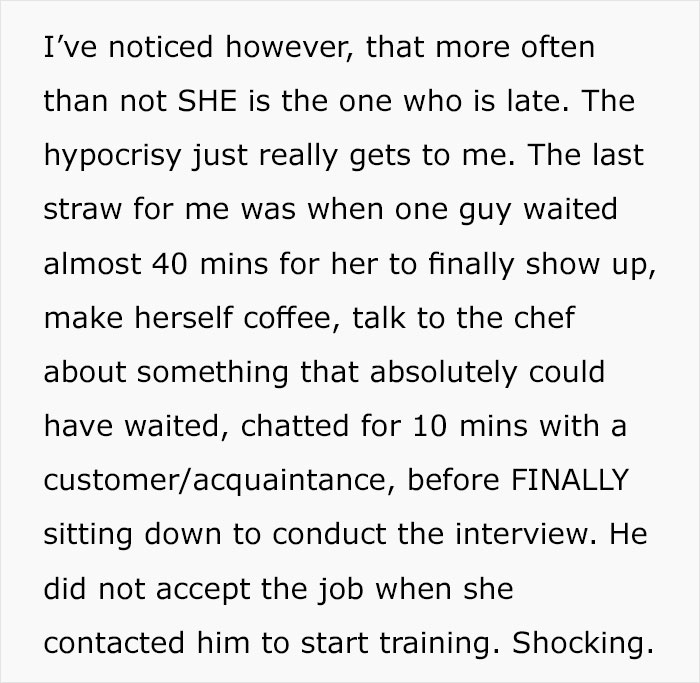
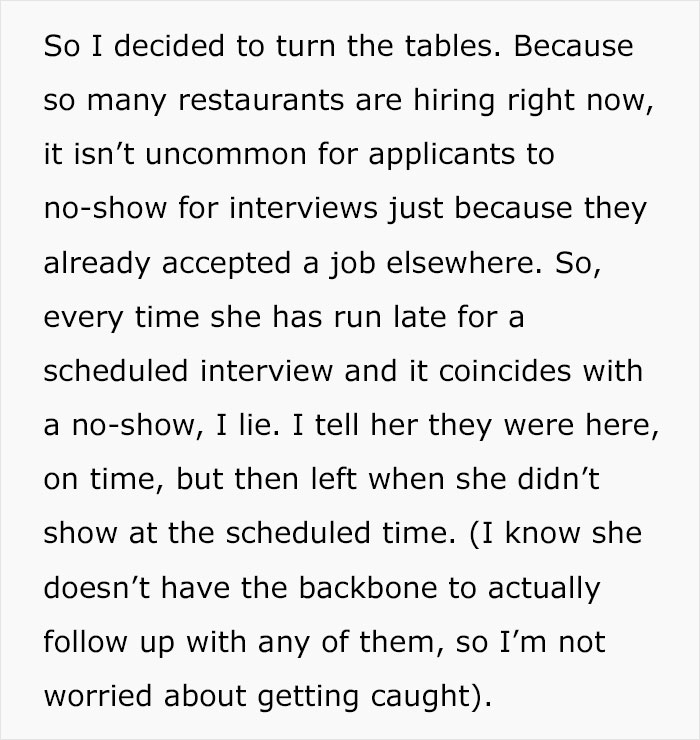
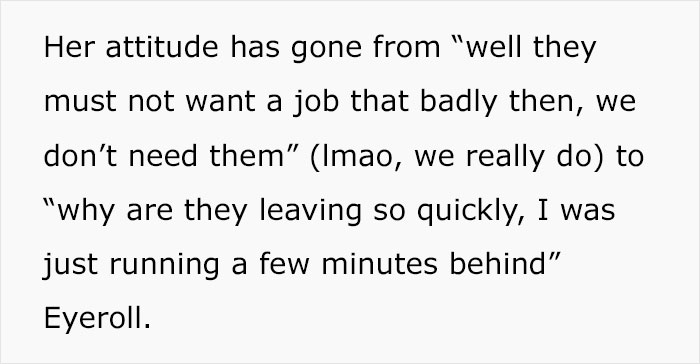
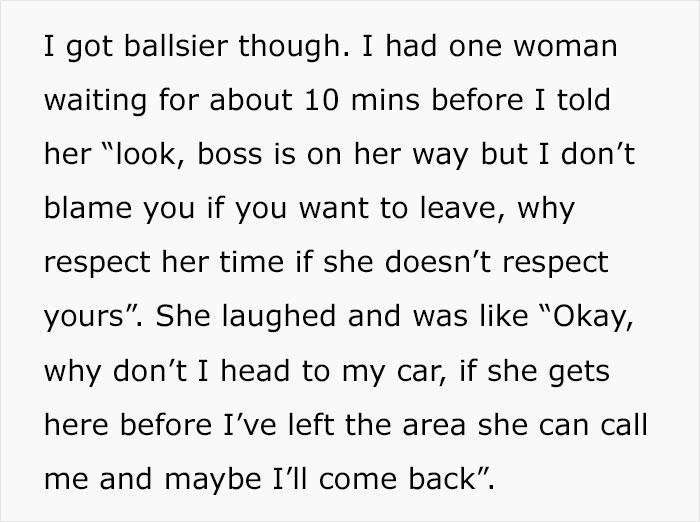
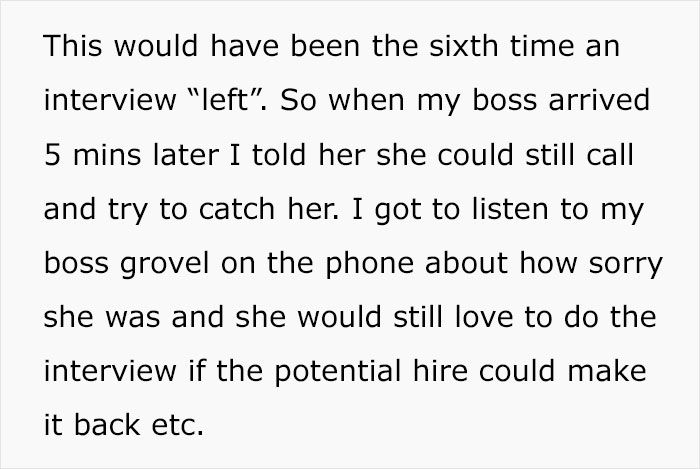

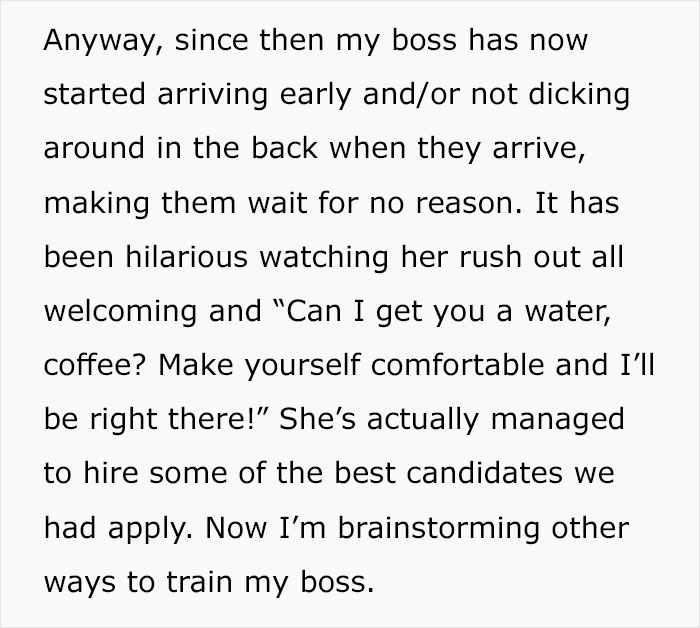
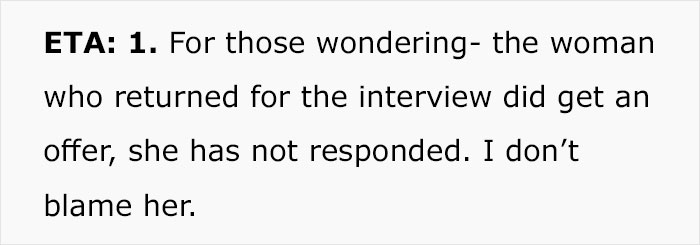
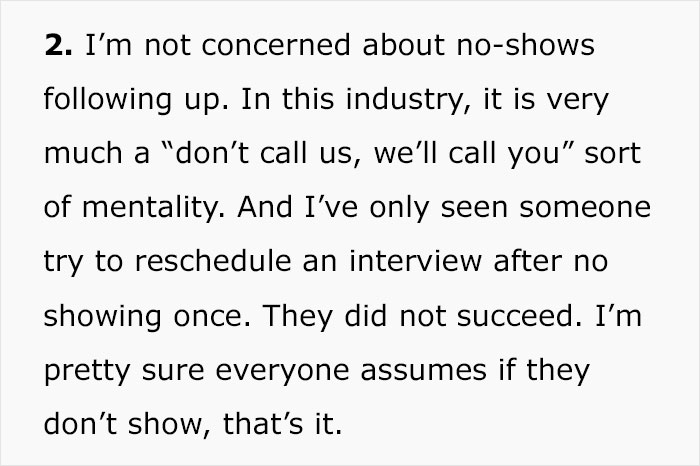


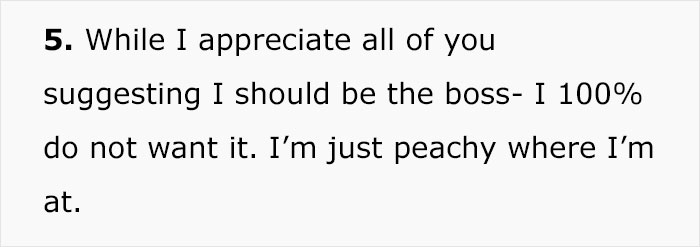



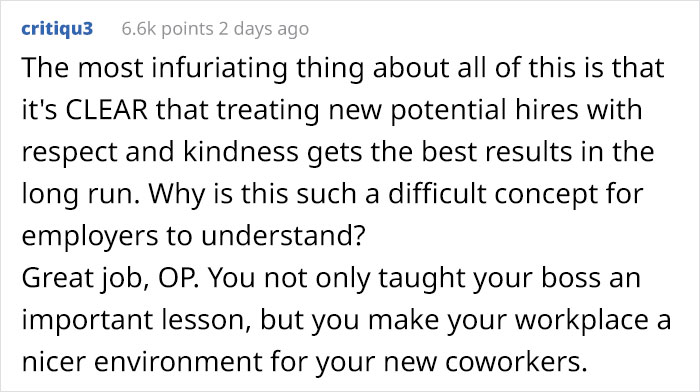














123
20